|
by Rabbi Judy Kummer Change doesn’t come easy for most of us. Many know the joke about the Buddhist monk who says to a hot dog vendor: "Make me one with everything." Chuckling, the vendor assembles the hot dog, gives it to the monk and says "that will be $4, please." The monk hands over a $20 bill, which the vendor pockets. After a moment, the monk asks for his change, at which point the vendor taps his chest and responds, “Change? Ah, change must come from within.” I grew up in a family not known for a love of change. My late grandfather was in fact so set in his ways that for some 50 years, he used a particular hair oil — in the days when men wore hair oil— and it turned out he hated this brand. So why continue using it? “I’ve used it all these years,” he said — “why should I change now?” Why change, indeed? Well, there are things we might do better, or might do at all, if only we were to try to change… Our Jewish tradition actually encourages us to change! When we wish each other a shannah tovah, a happy New Year, we can remember that the word shannah comes from the verb l’shanot, to change – so in fact we are wishing each other “a good change.” * * * * I’m a distance swimmer. Lately, I have faced a somewhat distressing situation: in the middle of blissful summertime lake swims — with blue skies overhead, green trees all around and sunshine spangling the silky water through which I glide, my body exulting with good health and my soul feeling full to overflowing— it’s been distressing that I have run aground, not once this summer but several times. It seems this year that my kick is off; one stroke has me swimming in less than straight lines. As I come ashore unwittingly, my hand will suddenly graze an underwater rock, my foot will touch the muck at the bottom of the pond. Limbs that had expected to feel nothing but the steady glide through water are now coming into contact with objects —and I will admit that I find the muck especially yucky. It feels slimy and rotten; while it’s been lying there placidly, it makes me wonder about any small creatures whose homes I had just disturbed who, creepily, might be swimming up to join me. But this is my new reality: until I get my stroke straightened out, I may be swimming ashore, whether I’ve aimed there or not. It seems like encountering this newness, this muck at the bottom of the pond, may be an experience I will need to learn to accept. And then, if I can accept this, who knows what other newness I might be open to, might even embrace? As we approach the High Holidays, we are asked to do a cheshbon hanefesh, a spiritual stock-taking, identifying patterns of behavior that might not have served us well in the past and experimenting with changing them. Perhaps we don’t have to go wading gleefully into the muck we might find, but putting a toe or even a foot down onto unfamiliar terrain can lead to a realization that it’s not so bad, that there’s been no harm, that newness could even possibly lead to good things – and it might result in our broaching some things we might have shied away from trying until that point. Our Jewish tradition holds hope that a new future might unfold for us, sparkling in the sunlight, if only we will be willing to try to change. Shannah tovah, a good change! Rabbi Judy Kummer is a board-certified chaplain in private practice, offering skilled spiritual care visits, eldercare programing and warm lifecycle events. She has served as Executive Director of the Jewish Chaplaincy Council of MA and other nonprofits, and has served congregations in DC, NY and NJ. She is happiest outdoors hiking in the woods, swimming in a lake at sunset or tending to her Boston organic garden. She can be reached at rabbikummer.com.
0 Comments
by Rabbi Ora Nitkin-Kaner The term ‘climate change’ can feel overly vague in part because of the ambiguity of the word ‘change.’ Change can come quickly or slowly. Change can feel welcome or catastrophic. Change can be the result of concerted, value-based effort--teshuvah—or carry the blunt force of surprise. June of this year was the first time I breathed in the smoke of distant wildfires. I knew it was a mix of luck and privilege that had shielded me up til then. I knew the smoke was coming, but the lived experience was still a surprise and the change still an invitation I never wanted to receive. Two months earlier, after I turned forty but before I breathed in the smoke from wildfires, springtime held the heartbreak of disasters that were still distant. From that place, I prayed that change come gently. I continue holding this prayer for myself, my dear ones and communities, and for you, as the seasons change once again. Woman at Forty [after Donald Justice] Forty, and the ophthalmologist’s technician suggests my vision is blurry. No, I say, it’s just soft. I don’t see anything wrong with tree tips a little hard to make out, spring creeping up the branches pulling a prayer: may all changes be as gentle as this one. After days of hard night rains the white and pink petals of the cherry and the stinkpear are scattered, some glued to the sidewalk, some breathed by the wind. Walking the dog, my right knee grumbles, pokes my brain to predict our future: fewer steps, maybe one day a replacement. The dog jaunts pain-free, or at least without caring to give it voice. We’re both scanning for chicken bones, a game for her: can she swallow before I open her jaw wide enough to pull out death. I focus on what’s in front of me: a new flush of petals are hole-punched paper. Same pink, same white, same sidewalk though. There’s always kids around here, bicycles and toys dropped and spinning, running down to pet the dog. It’s a small choice I make, to pause with time for their hands, their questions, to pause and look harder: poetry comes from looking but so does heartbreak, and right now I can’t see the difference. Rabbi Ora Nitkin-Kaner (she) is a climate change chaplain and founder of Exploring Apocalypse. Originally from Toronto, she now lives in New Haven.
by Bill Witherspoon Historical note: The Green Team at Congregation Bet Haverim, Atlanta created a lay-led service on July 15, 2022, called “Blessings on the Climate.” Our guest d’var presenter was meteorologist and JCAN-GA advisor Mark Papier. To balance Mark’s serious (also hopeful) message, we did this silly skit with two of our funniest members as mimes. Because of a technical glitch, only the tail end of the skit was preserved on YouTube, so you will not hear Bill Witherspoon, the writer and narrator, bray from the bimah; but all of Mark’s d’var can be heard. The unicorn went home with Mark as a gift to his young daughter. The event inspired last year’s Etude, ”Unfinished Blessing.” Bill Witherspoon is a geologist-educator and for 21 years a Jew by choice. At Congregation Bet Haverim in Atlanta, he sings in its remarkable chorus and occasionally leads services. He is a native of East Tennessee where he was blessed with many visits to its huge national park throughout his formative years. Bill encourages fellow humans to check out Citizens Climate Lobby.
by Rabbi Shahar Colt I used to work in a building next to what appeared to be an abandoned parking lot. Mostly it was a sheet of broken up concrete. The lines separating parking spaces were barely visible, and a huge tree stood somewhere near the center. Over the course of the spring and summer, weeds would grow, pushing through the spaces between the concrete, breaking it further with the slow persistence of plants. By late summer, the goldenrod was blooming and I sneezed as I biked by. From the street, the space was so full of weeds you couldn’t see the concrete anymore, the greenery had fully overtaken the lot, a mix of indigenous and invasive species vying for dirt and sunlight, creating the illusion of a meadow. At some point each year, someone came and mowed down the weeds, revealing the parking lot all over again. It was always disappointing, all that life cut down. I missed the greenery. But I was always more struck by the re-growth. Year after year, the plants took over the parking lot. I marveled at the capacity of all those plants to grow around pavement, despite it. My uncle’s words would repeat in my head, “A weed is only a plant that YOU don’t like.” Perhaps the plants growing in the parking lot were weeds to the lot’s owner, perhaps even the city had rules to prevent pests from moving in…but collectively they made something beautiful, a natural environment softening the landscape of an otherwise urban area. Each year I found comfort in the transformation from parking lot to “meadow” and back to parking lot. Humans may try to cover over the rich earth, we might try to cut down the plants, but the life force of the natural world pushes through. On a larger scale, while our own behaviors threaten the livability of earth for humans, the life force present in the diversity of plants and creatures will continue to push evolution in a changing environment. Natural beauty prevails. May that same life force continue to push me along the path of my own growth, through my own choices and mis-steps, as long as I live, and may it be a source of growth and re-growth for you, too. Rabbi Shahar Colt serves as the executive director for the Community Hevra Kaddisha of Greater Boston, and spiritual leader for Congregation Ahavas Achim in Westfield, MA. She lives in Watertown, MA with her spouse and children.
by Susan Elkodsi When I was in junior high, I was in the Environment Club, and one of our activities was a monthly recycling drive for newspapers and magazines. People would save them, bring them to the school, and we’d load up the truck. Then, the advisor would drive it to a place that would pay the club. The guys loved it, especially when someone included back issues of Playboy in with the rest of the papers. Then the girls were doing all the work. It's 50 years later, and where are we? We’re now recycling all kinds of things, and people and companies are figuring out ways to make new materials out of recycled ones. Our waterways are cleaner; for better or worse, the increased number of shark sightings in Long Island waters is testimony to that. That said, we’ve had weeks of unseasonably hot and humid temps, poor air quality from Canadian wildfires, and devastating rains and floods. Our planet is warming at an alarming rate. According to our ancient sages, The Holy One created humans on Rosh Hashanah, and our midrash (Kohelet Rabbah 7:13) teaches, “The Holy One of Blessing planted a garden, and put ha-adam, the human in it, l’ovdah u-l’shomrah, “to work it and guard it.” Because after all, “if you destroy it, there will be no one after you to repair it.” As we move towards Rosh Hashanah, with a focus on teshuva–turning back, repenting, making a commitment to do better, may we be blessed with the ability to learn how each of us can work to improve the condition of the earth; to help mitigate climate change and leave a better world for future generations. As Rabbi Tarfon (Pirkei Avot 2:16) said, " It is not your duty to finish the work, but neither are you at liberty to neglect it." Rabbi Susan Elkodsi is the spiritual leader of the Malverne Jewish Center on Long Island. She is committed to helping Baby boomers and older Jewish adults create meaning and purpose in their lives in a Jewish context, and to fighting ageism. She can be found at www.babyboomerrabbi.com.
by Dr. Cara Judea Alhadeff Objects As Storytellers: CoEvolving with Thomas Berry (a Sephardic Perspective) - YouTube
Notes related to the video can be found on the YouTube page. Dr. Cara Judea Alhadeff has published dozens of books and essays on interreligious eco-justice, philosophy, ethnic studies and gender. Her photographs (in collections including MoMASalzburg and San Francisco MoMA) have been defended internationally by freedom-of-speech organizations. Former professor at UC Santa Cruz, Alhadeff teaches, performs, and parents a creative-zero-waste life: www.carajudeaalhadeff.com. by Michael Shire I wonder if you have ever looked up at the night sky and wondered how big it is…how far it stretches…..how immense the universe is……? Or how there are thousands upon thousands of suns, stars, planets and moons, thousands of solar systems and galaxies? And I wonder how you feel when you look up into the vast space and how see how very big it is? I wonder what you feel when you realize that you are part of it…and also that it is part of you? And God saw all there was in the universe and said ‘It is good.’ In that vast space there is one very small planet and it is our earth. When seen from space, earth looks like one great swirling mass of blue because a large part of it is made up of water. And God saw all the water and said ‘It is very good.’ As you get closer to earth, you see great masses of colorful lands. Some are so big they contain many countries. And God Said, ‘I will fill the land with every kind, creatures that fly in the air and creatures that swim in the waters and creatures that walk on the land.' Then God said, ‘Let us make people in the image of God, male and female’. God rested and gave us the gift of rest. The angels asked, ’Is the world finished?’ And God said, ‘Go ask the people’. And God said to the people, ‘See my world, how beautiful it is. Do not do anything to hurt or destroy it because there will be no one to fix it after you.’ The people began to build cities with houses large and small. They cut down trees from the forests and filled up the open spaces. Some animals lost their homes and the lack of trees caused flooding in the land. The people made roads and train tracks so that they could travel by car and train and plane. But the fumes from the cities and the cars sent smoke into the air. It made a heavy blanket heating up the earth causing the icecaps to melt and the seas to rise. People had trouble breathing the air in the big cities. People threw trash and spilled oil into the seas and some creatures that swim in the waters couldn’t live there anymore. Now the water and the land, the green and growing things and the creatures in the air and seas and on the land and the people were in trouble. And God looked at the world and said…. Wondering Questions: I wonder what you think God said? I wonder which part of the story you liked best? I wonder which part of the story is the most important? I wonder what might happen next? I wonder what we might do to make the world beautiful again? Michael Shire is the Rabbi of Central Reform Temple, Boston and Professor at Hebrew College Boston.
by Rabbi Margaret Frisch Klein I am a lifelong Girl Scout. My love of the out-of-doors comes from many years camping, hiking, canoeing at Girl Scout camps throughout the Midwest, New England and yes Canada. All summer I have been haunted by an old camp song, known as “Canadian Wilderness” or “The Life of a Voyager”. One verse sings: “Call of the lonely loon coyotes howling at the moon wind rustling through the trees that’s a Canadian breeze smoke rising from the fire up through the trees in a stately spire breathe a sigh in the evening glow sun goes down, those north winds blow.” It paints a picture of canoeing from town to town and the beauty of the wilderness. This has been the summer of smoke. Smoke from Canada. Smoke from wildfires. Beautiful sunsets. But those sunsets belie the fact that the smoke is dangerous. Air quality alert days. Hard to breathe. Apocalyptic looking photos. Must stay inside. This is not a new problem. Years ago, Canada was not happy with the United States for sending acid rain to Canada. Now we hear some Americans unhappy with Canada for the smoke. The American government has sent aid. Still, it is not enough. Those fires, multiple fires may not even be fully out until after the first snowfall. It is not Canada’s fault alone. Climate change is real. It is hard to deny it, although some do, in this the hottest summer ever recorded. Ocean water temperatures in Florida of over 100 degrees. More than 15 days of scorching heat in the desert southwest of more than 115 degrees. Athens at 111 degrees—and Greece has fires too. Drought in Illinois leading to early fall leaves falling off trees in June. Tornados and floods and other storms. This is a global problem. It demands a global solution. Not years from now. Right now. It also demands spiritual discipline. One of the first steps in teshuvah, returning, repentance is confessing our sins. Part of the Yom Kippur liturgy is reciting Al Chet, “ For the sin which we have sinned...” Here are few new verses for this emergency: For the sin which we have sinned by not taking care of the earth. And for the sin which we have sinned with our haughtiness. For the sin which we have sinned by not listening to and believing scientists And for the sin which we have sinned by denying what is happening. For the sin which we have sinned by not realizing how interconnected we are. And for the sin which we have sinned by not recognizing that our individual actions impact others, For the sin which we have sinned by our reliance on fossil fuels. And for the sin which we have sinned by not developing and using alternative energy sources. For the sin which we have sinned by not protecting our waterways. And for the sin which we have sinned by not providing drinkable water. For the sin which we have sinned by continuing to purchasing to excess And for the sin which we have sinned by using too much packaging. For the sin which we have sinned by wanting food at any time from anywhere. And for the sin which we have sinned by not supporting local farms and buying food “in season.” For the sin which we have sinned by refusing to act. And for the sin which we have sinned by refusing to protect our inheritance for the next generations. For all of these sins, O G-d of Creation, pardon us, forgive us, grant us atonement For all of these sins, Ruler of the whole Universe, inspire us, strengthen us and give us the courage to repair Your world. Rabbi Margaret Frisch Klein is the rabbi of Congregation Kneseth Israel in Elgin, IL, where she enjoys hiking and running. She blogs as the Energizer Rabbi, www.theenergizerrabbi.org and has two books published. (Climbing Towards Yom Kippur, and Enduring Spirit) She serves on a number of non-profit boards including the Association of Rabbis and Cantors, the Coalition of Elgin Religious Leaders, the Community Leadership Board of St. Jospeh Hospital and volunteers as an Elgin Police Chaplain.
by Rabbi Louis Polisson Blessed is She Who causes day to pass and brings the night (1) May She raise up perfect healing to all who are struck (2) Whether they are silent, plant, a living animal, a speaking being (3) Light from darkness, darkness from light (1) May She bring us out from the demonic fire (4) Selfishness The harmful impulse May She cause us to cleave to the good impulse and acts of repair (5) Deeds of healing In wisdom She opens the gates of righteousness (1, 6) And in understanding she diversifies created beings (1, 7) At the end of the year Facing the head of the year We have come to sanctify the darkness (8) To repair the world through the sovereign presence of the Mighty One (9) To distinguish and to unite and to become one Between day and night (1) Living and enduring Spirit (10) May You always guide us, forever and ever Blessed is She Creatress of the mixtures of evenings (1) בוראת לילה ויום ברוכה היא מעבירה יום ומביאה לילה הַעֲלִי רפואה שלמה לכל מכותינו בין שהוא דומם, צומח, חיה, מדברת אור מחשך וחשך מאור הוֹצִיאִינו מאור שדי אנוכיות יצר הרע ודבקי אותנו ביצר הטוב ומעשי תיקון מעשי רפואה בחכמה פותחת שערי צדק ובתבונה מְשַׁנָּה את הבריות בסוף השנה פני ראש השנה באנו חשך לקדש לתקן עולם במלכות שדי להבדיל ולאחד אלהאחד בין יום ובין לילה רוח חי וקים תמיד תִּמְלְכִי עלינו לעולָם ועד ברוכה היא המעריבה ערבים Louis Polisson is a musician, poet, and rabbi, ordained by the Jewish Theological Seminary in 2018, where he also earned an MA in Jewish Thought focusing on Kabbalah and Ḥasidut. He currently serves as the Associate Rabbi and Music Director at Congregation Beth Sholom in Teaneck, New Jersey. He previously served for five years as the solo clergy of Congregation Or Atid in Wayland, Massachusetts. Louis and his wife Gabriella Feingold released an album of original Jewish and nature-based spiritual folk music in November 2018 - listen at https://louisandgabriella.bandcamp.com/album/as-full-of-song-as-the-sea. Sources cited and/or paraphrased:
by Judith Felsen, Ph.D. Blessed are we who have strayed and returned called back by Your mercy, awakened from selfishness to holiness, from cruelty to kindness. Unseeing we concealed, justified, perfected, means to reach our ends, claim desires, perhaps ignorant of damage done, unaware of straying far from You. Detours often deadly to our peace, balance and well- being are brought to halt, corrected paths of our atonement filled, with deep regret, our shame and sadness, healthy guilt a guide of our return to holiness. Returned we recognize the place from which we came. Blessed we are to live in 13 Attributes divine, enriched with lessons, errors, sins corrected, trails cleared with soul emancipated, debris of our myopia no longer in the way. Blessed we are to have another chance, Elul a context for amends, atonement is our action. We walk in humbleness with flaws exposed, a time to for gratitude and grace that we are seen, rebuked, and redirected. The path we follow to Your palace takes us home. With You and worthiness which we have earned in Elul’s regimen, we now feel ready. Reconnected, we are one. Baruch Hashem Judith Felsen, Ph.D. is a 2nd generation Holocaust survivor, Baal teshuvah aspirant, more of a poetess, hiker, walker, mystic, dancer and naturalist than a psychologist. Judith, wife of Jack and dog mother of Emmy (aging Newfy) is a resident of Bartlett, New Hampshire and a member of the Bethlehem Hebrew Congregation where she offers the dvar Torah for Kabbalat Shabbat services from October through June. Judith has been blessed to continue to experience rabbi Katy as a muse currently and for several decades.
|

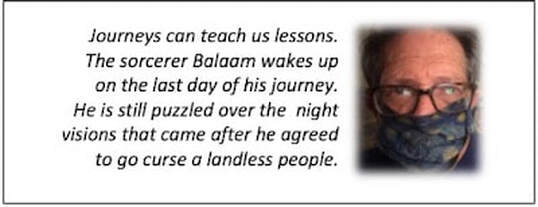

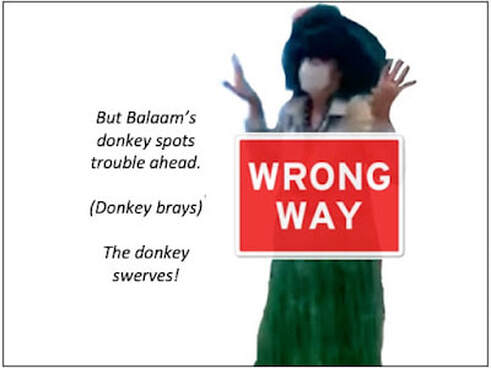
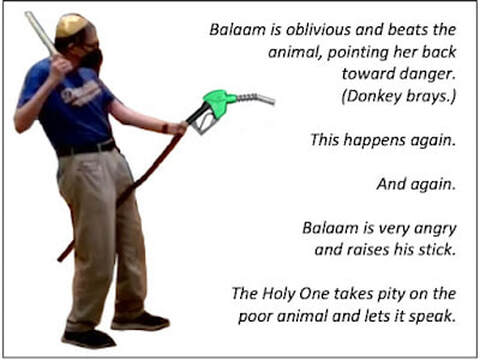
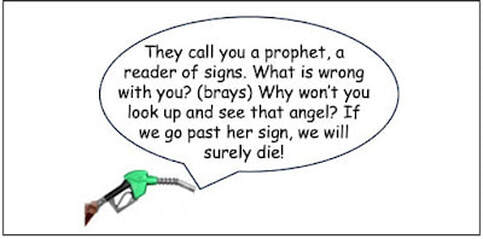
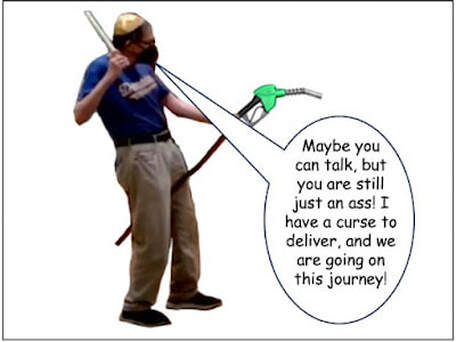
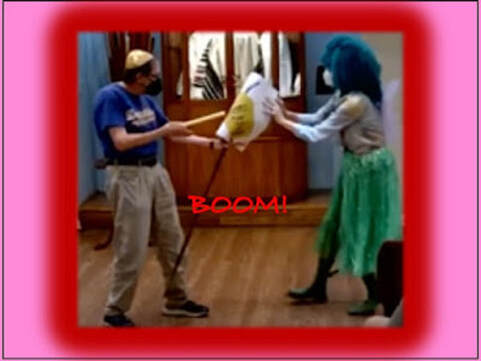

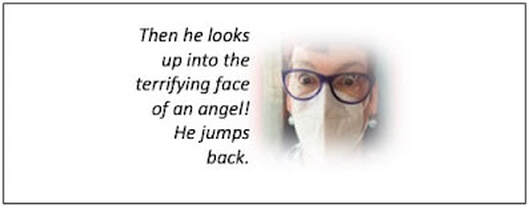
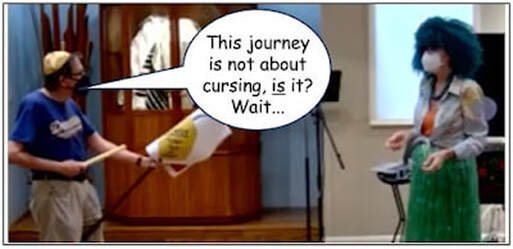
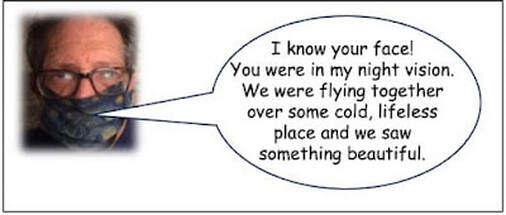
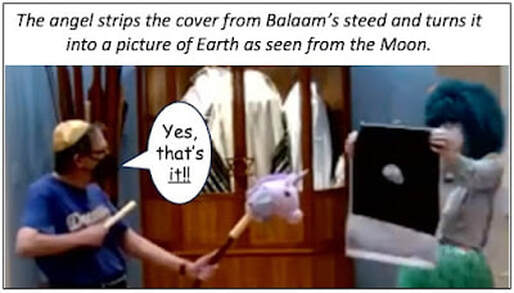
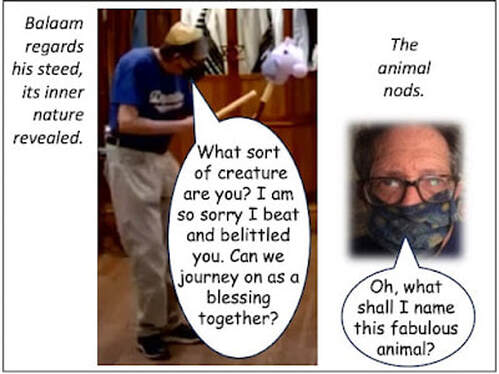
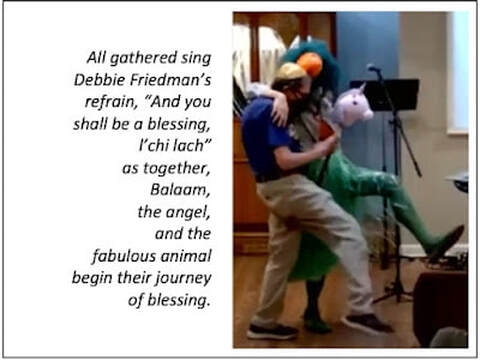
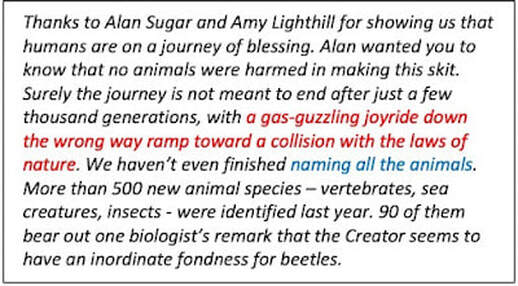
 RSS Feed
RSS Feed